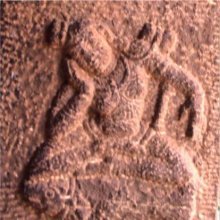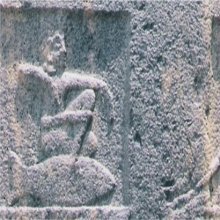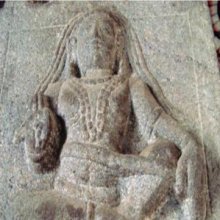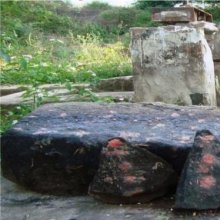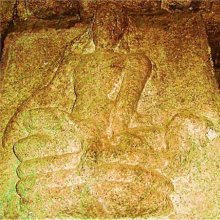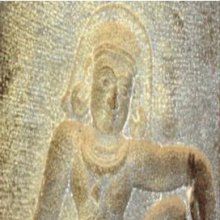Lola, Lolā: 21 definitions
Introduction:
Lola means something in Buddhism, Pali, Hinduism, Sanskrit, Marathi, Jainism, Prakrit. If you want to know the exact meaning, history, etymology or English translation of this term then check out the descriptions on this page. Add your comment or reference to a book if you want to contribute to this summary article.
Images (photo gallery)
(+6 more images available)
In Hinduism
Purana and Itihasa (epic history)
Source: archive.org: Puranic EncyclopediaLola (लोल).—Son of a great sage called Siddhavīra. Lola in his later birth was born of a queen named Utpalāvatī. His name then was Tāmasama. (Mārkaṇḍeya Purāṇa).
Source: Cologne Digital Sanskrit Dictionaries: The Purana IndexLolā (लोला).—The Goddess enshrined at Utpalāvastaka.*
- * Matsya-purāṇa 13. 45.

The Purana (पुराण, purāṇas) refers to Sanskrit literature preserving ancient India’s vast cultural history, including historical legends, religious ceremonies, various arts and sciences. The eighteen mahapuranas total over 400,000 shlokas (metrical couplets) and date to at least several centuries BCE.
Ayurveda (science of life)
Source: gurumukhi.ru: Ayurveda glossary of terms1) Lola (लोल):—[lolaḥ] Desire or Fond of
2) [lolaṃ] Unsteady activites

Āyurveda (आयुर्वेद, ayurveda) is a branch of Indian science dealing with medicine, herbalism, taxology, anatomy, surgery, alchemy and related topics. Traditional practice of Āyurveda in ancient India dates back to at least the first millenium BC. Literature is commonly written in Sanskrit using various poetic metres.
Shaktism (Shakta philosophy)
Source: Google Books: Manthanabhairavatantram1) Lolā (लोला) refers to one of the maids (cellakā) associated with Jālandhara, one of the sacred seats (pīṭha), according to the Manthānabhairavatantra, a vast sprawling work that belongs to a corpus of Tantric texts concerned with the worship of the goddess Kubjikā.—Nine of the twelve female servants (three in each of the first four seats), are low-caste women who we find, in other contexts, embody the Mothers (mātṛkā). The maids (cellakā) [i.e., Lolā] are Yoginīs and the servants their male counterparts. These replace the spiritual ‘sons’ and ‘daughters’ the goddess generates and the guardians she appoints in the sacred seats listed in the ‘Kubjikāmatatantra’.
2) Lola (लोल) refers to the “rolling (of the eyes)”, according to the Lalitāsahasranāma.—Lalitā’s thousand names are eulogized in the Lalitāsahasranāma, describing the goddess’s spiritual beauty on the analogy of physical, sensuous beauty. [...] She embodies ultimate reality conceived as supreme bliss—ānanda. This bliss is embodied in her. It is the ‘passion that makes her eyes roll’ (lola-akṣī-kāmarūpiṇī) (454). She is “the form of desire in women”. This is not the Advaitin’s ānanda, which is just a covert counter-correlate of Samsaric suffering (duḥkha), it is positive bliss generated by the union of opposites. She embodies the great play of intercourse between herself and her partner (mahārati) (218). Similarly, she is the Great Enjoyment (mahābhogā) (219). [...]

Shakta (शाक्त, śākta) or Shaktism (śāktism) represents a tradition of Hinduism where the Goddess (Devi) is revered and worshipped. Shakta literature includes a range of scriptures, including various Agamas and Tantras, although its roots may be traced back to the Vedas.
In Buddhism
Theravada (major branch of Buddhism)
Source: Pali Kanon: Pali Proper NamesA Paribbajika, sister of Saccaka. (J.iii.1)
See also the Cullakalinga Jataka. After the discussion which she and her sisters had with Sariputta, in which they were defeated, she joined the Order with the others and became an arahant. MA.i.450f.
Theravāda is a major branch of Buddhism having the the Pali canon (tipitaka) as their canonical literature, which includes the vinaya-pitaka (monastic rules), the sutta-pitaka (Buddhist sermons) and the abhidhamma-pitaka (philosophy and psychology).
Languages of India and abroad
Pali-English dictionary
Source: BuddhaSasana: Concise Pali-English Dictionarylola : (adj.) greedy; unsteady.
Source: Sutta: The Pali Text Society's Pali-English DictionaryLola, (Loḷa) (adj.) (fr. luḷ: see luḷati; cp. Epic & Classic Sk. lola) wavering, unsteady, agitated; longing, eager, greedy S. IV, 111; Sn. 22, 922; J. I, 49 (Buddha-mātā lolā na hoti), 111, 210, 339 (dhana-loḷa); II, 319 (°manussa); III, 7; Pug. 65; Nd1 366; Dāvs. IV, 44; Miln. 300.—alola not greedy, not distracted (by desire), self-controlled S. V, 148; Sn. 65.

Pali is the language of the Tipiṭaka, which is the sacred canon of Theravāda Buddhism and contains much of the Buddha’s speech. Closeley related to Sanskrit, both languages are used interchangeably between religions.
Marathi-English dictionary
Source: DDSA: The Molesworth Marathi and English Dictionarylōla (लोल).—a S Active or motionful; i. e. dangling, trembling, quivering, shaking, moving tremulously or with liveliness. 2 fig. Impatient, eager, ardent.
--- OR ---
lōlā (लोला).—a (lōla S Dangling or shaking.) Dangling as withered or impaired, crippled--a limb or member; and crippled--a person or animal. See lulā throughout. lōlā is used (rather more commonly than lulā) as a noun and as masculine, in the sense of A crippled, paralysed, or shattered person (male or female); as hā (hī or hēṃ) lōlā jhālā or hōūna paḍalā (paḍalī or paḍalēṃ).
--- OR ---
lōlā (लोला).—m (S) The clapper or tongue of a bell; the pendulum of a clock &c. 2 fig. The uvula. The popular form is lōḷā.
--- OR ---
lōḷa (लोळ).—m A roaring sheet of flame; a glowing fire; a blazing up or out. 2 A swarm (of bees, flies &c.)
--- OR ---
lōḷa (लोळ).—m (lōḷaṇēṃ or lōlana) Rolling over and over; esp. the wild rolling about of one under passionate crying or ungoverned wailing; and, in this qualification of sense, conjoined with raḍaṇyā- cā or raḍūna. v ghē, ghāla. 2 fig. Worried or wearied state; prostration or exhaustion as through sickness or a vexation. Ex. pōrānēṃ or tāpānēṃ mājhyā jivācā lōḷa kēlā. 3 (Perhaps for lōtha or lōdha) A term for a squat, thickset, and roundbellied child; also for any overgrown or enormously big animal, esp. among the smaller animals; as kāya hō ghuśīcā lōḷa sāmpaḍalā piñjaṛyānta; kāya muṅgusācā lōḷa cālalā; māñjarīnēṃ undirācā lōḷa dharalā; also for a monstrous and misshapen bale, pack, or mass indefinitely; as nijūna lōḷa paḍaṇēṃ or pasaraṇēṃ To lie along as a huge log, or spread abroad as a washerman's pack. In this sense pāṅgharūṇācā lōḷa, kāmācā lōḷa &c.
--- OR ---
lōḷā (लोळा).—m (lōlā S) The clapper or tongue of a bell; the pendulum of a clock &c. 2 The uvula. 3 A piece of flesh as bitten or pinched out. v ghē, tōḍa, kāḍha. 4 A mass (as of dough, mortar, kneaded mud &c.) as plucked or grasped. v ghē, kāḍha. lōḷā tōḍaṇēṃ (To tear out a mass of one's flesh.) A phrase used by parents in giving away a daughter in marriage; also by or of a miser in parting with his money.
Source: DDSA: The Aryabhusan school dictionary, Marathi-Englishlōḷa (लोळ).—m Rolling over and over. A glowing fire.
--- OR ---
lōḷā (लोळा).—m The clapper of a bell. The pendulum of a clock.
Marathi is an Indo-European language having over 70 million native speakers people in (predominantly) Maharashtra India. Marathi, like many other Indo-Aryan languages, evolved from early forms of Prakrit, which itself is a subset of Sanskrit, one of the most ancient languages of the world.
Sanskrit dictionary
Source: DDSA: The practical Sanskrit-English dictionaryLola (लोल).—a. [loḍ-ac ḍasya laḥ, lul ghañ vā]
1) Shaking, rolling, tremulous, moving to and fro, quivering, dangling, trembling; flowing, waving (as locks of hair); परिस्फुरल्लोलशिखाग्रजिह्वं जगज्जिघत्सन्तमिवान्तवह्निम् (parisphurallolaśikhāgrajihvaṃ jagajjighatsantamivāntavahnim) Kirātārjunīya 3.2; लोलां- शुकस्य पवनाकुलितांशुकान्तम् (lolāṃ- śukasya pavanākulitāṃśukāntam) Ve.2.22; ततस्ततः प्रेरितलोललोचना (tatastataḥ preritalolalocanā) Ś.1.23; लोलापाङ्गैः लोचनैः (lolāpāṅgaiḥ locanaiḥ) Meghadūta 27; R.18.43.
2) Agitated, disturbed, restless, uneasy.
3) Fickle, inconstant, changing, unsteady; येन श्रियः संश्रयदोषरूढं स्वभावलोलेत्ययशः प्रमृष्टम् (yena śriyaḥ saṃśrayadoṣarūḍhaṃ svabhāvaloletyayaśaḥ pramṛṣṭam) R.6.41; so Kumārasambhava 1.43.
4) Frail, transient; क्व बत हरिणकानां जीवितं चातिलोलम् (kva bata hariṇakānāṃ jīvitaṃ cātilolam) Ś.1.1.
5) Longing or anxious for, eager for, eagerly desirous of (mostly in comp.); अग्रे लोलः करिकलभको यः पुरा पोषितोऽभूत् (agre lolaḥ karikalabhako yaḥ purā poṣito'bhūt) Uttararāmacarita 3.6; हस्तं कम्पवती रुणद्धि रशनाव्यापारलोलाङ्गुलिम् (hastaṃ kampavatī ruṇaddhi raśanāvyāpāralolāṅgulim) M.4.14; कर्णे लोलः कथयितुमभूदाननस्पर्शलोभात् (karṇe lolaḥ kathayitumabhūdānanasparśalobhāt) Meghadūta 15; Śiśupālavadha 1.61;8.46; 1.66; Kirātārjunīya 4.2;16.16; Meghadūta 63; R.7.23;9.37; 16.54,61.
6) Greedy, lustful.
-lā 1 Name of Lakṣmī.
2) Lightning.
3) The tongue.
-lī (In music) A kind of composition.
Source: Cologne Digital Sanskrit Dictionaries: Shabda-Sagara Sanskrit-English DictionaryLola (लोल).—mfn.
(-laḥ-lā-laṃ) 1. Shaking, tremulous. 2. Rolling, tossing. 3. Agitated, alarmed. 4. Fickle, unsteady. 5. Desiring, wishing, cupidinous. 6. Greedy. f.
(-lā) 1. The tongue. 2. The goddess Lakshmi, or the goddess of wealth and fortune. 3. A species of the Sarkari metre. 4. Lightning. E. loḍ to be frantic, ac aff.
Source: Cologne Digital Sanskrit Dictionaries: Benfey Sanskrit-English DictionaryLola (लोल).—i. e. lul + a, I. adj. 1. Shaking, tremulous, [Hitopadeśa] i. [distich] 152, M.M.: trembling, [Mālatīmādhava, (ed. Calc.)] 21, 8. 2. Agitated, [Ṛtusaṃhāra] 6, 31. 3. Unsteady, [Bhartṛhari, (ed. Bohlen.)] 3, 36. 4. Desiring, [Meghadūta, (ed. Gildemeister.)] 101; greedy, [Rājataraṅgiṇī] 5, 376. Ii. f. lā. 1. The tongue. 2. Lakṣmī.
Source: Cologne Digital Sanskrit Dictionaries: Cappeller Sanskrit-English DictionaryLola (लोल).—[adjective] moving hither and thither, restless, unsteady; greedy, eager or longing for ([locative], infin., or —°); [abstract] tā [feminine], tva [neuter]
Source: Cologne Digital Sanskrit Dictionaries: Monier-Williams Sanskrit-English Dictionary1) Lola (लोल):—[from lul] a mf(ā)n. moving hither and thither, shaking, rolling, tossing, dangling, swinging, agitated, unsteady, restless, [Mahābhārata; Kāvya literature] etc.
2) [v.s. ...] changeable, transient, inconstant, fickle, [Kāvya literature; Kathāsaritsāgara]
3) [v.s. ...] desirous, greedy, lustful, (ifc.) eagerly desirous of or longing for ([locative case] [infinitive mood] or [compound]), [Kāvya literature; Varāha-mihira] etc.
4) [v.s. ...] m. the penis, [Demetrius Galanos’s Lexiko: sanskritikes, anglikes, hellenikes]
5) [v.s. ...] Name of a man, [Mārkaṇḍeya-purāṇa]
6) Lolā (लोला):—[from lola > lul] f. the tongue, [cf. Lexicographers, esp. such as amarasiṃha, halāyudha, hemacandra, etc.]
7) [v.s. ...] lightning, [Prabodha-candrodaya] ([varia lectio])
8) [v.s. ...] ‘the fickle or changeable one’, Name of the goddess of fortune or Lakṣmī, [Pañcarātra]
9) [v.s. ...] of Dākṣāyaṇī in Utpalāvartaka, [Catalogue(s)]
10) [v.s. ...] of the mother of the Daitya Madhu, [Rāmāyaṇa]
11) [v.s. ...] of a Yoginī, [Hemādri’s Caturvarga-cintāmaṇi]
12) [v.s. ...] of two metres, [Chandomañjarī; Colebrooke]
13) Lola (लोल):—b lolita etc. See p.905, [columns] 1, 2.
Source: Cologne Digital Sanskrit Dictionaries: Yates Sanskrit-English DictionaryLola (लोल):—[(laḥ-lā-laṃ) a.] Shaking; desiring. f. The tongue; Lakshmī.
Source: DDSA: Paia-sadda-mahannavo; a comprehensive Prakrit Hindi dictionary (S)Lolā (लोला) in the Sanskrit language is related to the Prakrit words: Līlā, Lola.
[Sanskrit to German]
Sanskrit, also spelled संस्कृतम् (saṃskṛtam), is an ancient language of India commonly seen as the grandmother of the Indo-European language family (even English!). Closely allied with Prakrit and Pali, Sanskrit is more exhaustive in both grammar and terms and has the most extensive collection of literature in the world, greatly surpassing its sister-languages Greek and Latin.
Prakrit-English dictionary
Source: DDSA: Paia-sadda-mahannavo; a comprehensive Prakrit Hindi dictionary1) Lola (लोल) in the Prakrit language is related to the Sanskrit word: Luṭh.
2) Lola (लोल) also relates to the Sanskrit word: Loṭha.
3) Lola (लोल) also relates to the Sanskrit word: Lola.
Prakrit is an ancient language closely associated with both Pali and Sanskrit. Jain literature is often composed in this language or sub-dialects, such as the Agamas and their commentaries which are written in Ardhamagadhi and Maharashtri Prakrit. The earliest extant texts can be dated to as early as the 4th century BCE although core portions might be older.
Kannada-English dictionary
Source: Alar: Kannada-English corpusLoḷa (ಲೊಳ):—[noun] (usu. used in dupl. ಲೊಳಲೊಳ [lolalola]) a onomatopoeic word expressing emptiness, blankness, etc.
--- OR ---
Lōla (ಲೋಲ):—
1) [adjective] not steady; not firm or stable; shaky; unsteady.
2) [adjective] glowing unsteadly or shining with a wavering light.
--- OR ---
Lōla (ಲೋಲ):—
1) [noun] the quality or fact of being unsteady; instability; unsteadiness.
2) [noun] love; affection.
3) [noun] a man or boy who is playing or has the tendency of being playful.
4) [noun] a man given to excessive sexual pleasures.
5) [noun] a loving, affectionate man.
--- OR ---
Lōḷa (ಲೋಳ):—
1) [adjective] not steady; not firm or stable; shaky; unsteady.
2) [adjective] glowing unsteadly or shining with a wavering light.
--- OR ---
Lōḷa (ಲೋಳ):—
1) [noun] the quality or fact of being unsteady; instability; unsteadiness.
2) [noun] love; affection.
3) [noun] a man or boy who is playing or has the tendency of being playful.
4) [noun] a man given to excessive sexual pleasures.
5) [noun] a loving, affectionate man.
Kannada is a Dravidian language (as opposed to the Indo-European language family) mainly spoken in the southwestern region of India.
Nepali dictionary
Source: unoes: Nepali-English Dictionary1) Lola (लोल):—adj. 1. shaking; rocking; trembling; 2. restless; impatient;
2) Lolā (लोला):—n. 1. pendent flesh; 2. water filled balloon; 3. children's toys; 4. pl. of लोलो [lolo]
Nepali is the primary language of the Nepalese people counting almost 20 million native speakers. The country of Nepal is situated in the Himalaya mountain range to the north of India.
See also (Relevant definitions)
Starts with (+48): Lola Jataka, Lola-mati, Lolaakanta, Lolabhava, Lolac, Lolacakshus, Lolacibuka, Lolad, Loladbhuja, Loladisu, Loladu, Loladvishalanayana, Lolaghata, Lolaghola, Lolai, Lolajihva, Lolajnana, Lolak, Lolaka, Lolakambanem.
Ends with (+52): Abhilola, Agica Lola, Agica-lola-kallola, Ahilola, Allakallola, Allolakallola, Alola, Amlola, Arthalola, Atilola, Baalola, Cakkhulola, Catullola, Catulola, Chatullola, Chatulola, Chatvullola, Cimtalola, Dhanalola, Dolalola.
Full-text (+88): Mahalola, Alola, Lolakshi, Kamalola, Catulola, Lolalola, Lolajihva, Lolata, Lolakarna, Vyalola, Pralola, Lolarka, Lolakshika, Rola, Kallola, Lolaghata, Vilolam, Lila, Lolekshana, Lolanetra.
Relevant text
Search found 32 books and stories containing Lola, Lolā, Lōla, Lōlā, Lōḷa, Lōḷā, Loḷa; (plurals include: Lolas, Lolās, Lōlas, Lōlās, Lōḷas, Lōḷās, Loḷas). You can also click to the full overview containing English textual excerpts. Below are direct links for the most relevant articles:
Garga Samhita (English) (by Danavir Goswami)
Verse 4.19.34 < [Chapter 19 - A Thousand Names of Srī Yamunā]
Verse 2.22.27 < [Chapter 22 - The Rāsa-dance Pastime]
Verse 4.20.10 < [Chapter 20 - The Killing of Pralamba]
Bhakti-rasamrta-sindhu (by Śrīla Rūpa Gosvāmī)
Verse 3.5.22 < [Part 5 - Conjugal Love (mādhurya-rasa)]
The Markandeya Purana (by Frederick Eden Pargiter)
Amarakoshodghatana of Kshirasvamin (study) (by A. Yamuna Devi)
External Anatomy < [Chapter 3 - Social Aspects]
Flora (5): Trees < [Chapter 5 - Aspects of Nature]
Bhajana-Rahasya (by Srila Bhaktivinoda Thakura Mahasaya)
Text 19 < [Chapter 3 - Tṛtīya-yāma-sādhana (Pūrvāhna-kālīya-bhajana–niṣṭhā-bhajana)]
Sahitya-kaumudi by Baladeva Vidyabhushana (by Gaurapada Dāsa)
